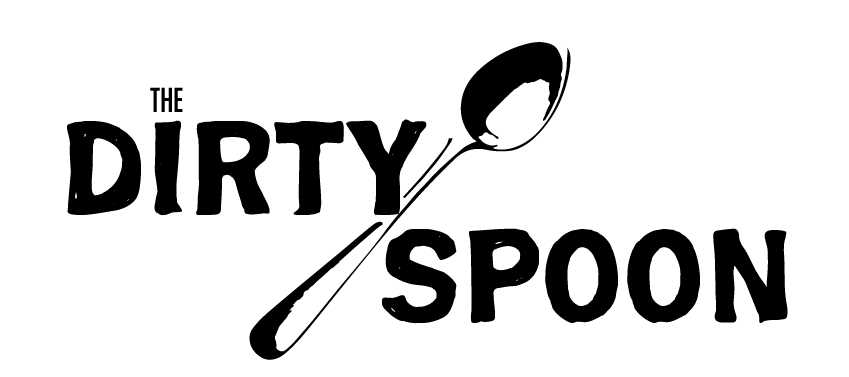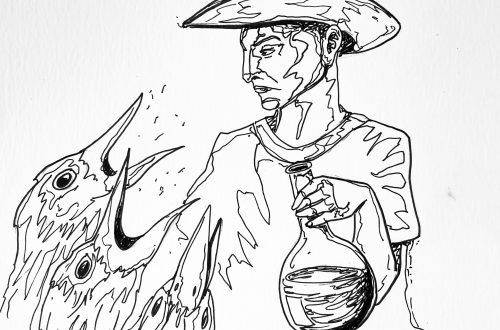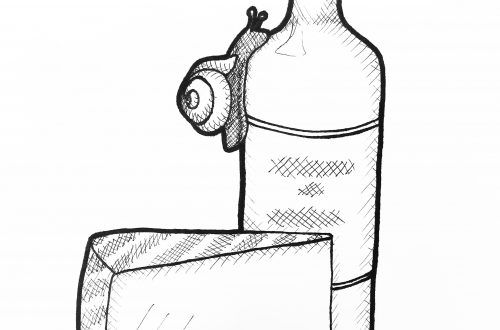By Jonathan Ammons
Do you remember your first beer? I do. An underage friend in school had picked some up from another guy. A 12 pack of Milwaukee’s Best. Lukewarm, slightly stale and tasting like all the riches of the finest horse piss in Milwaukee. Those first sips were a mix of a grimace and snot-spewing laughter. At our tiny school where drinking was forbidden, Brad and I would often sneak off campus to sit in a car, listen to terrible country music, smoke cigarettes and drink can after can of what became a staple beer for us. So when I turned twenty-one and had my first taste of a Highland Oatmeal Stout, and my first Guinness, I realized I was standing at the edge of the proverbial woods.
I got a notebook and started keeping tabs on the beers that I liked and the ones I didn’t. I would buy mixed six-packs from the grocery stores so that I could try all kinds of the new things. Having no concept of micro brewing or craft brewing, you would often see Heineken clanging against Sam Adams and Highland Gaelic Ale in my shopping cart. I had no idea what I was getting into. It took a while to understand that there was even a difference between a Pale Ale and an IPA. I had no experience, no knowledge of the language, no understanding of the subtleties, no clue.
It was that early learning, the voraciousness to try new things, that taught me how to approach food and booze. It’s how we all learn, through the folly of experience. I always think about a time I was bar tending at a little dive restaurant. A young couple bounded in and sat in a booth near the bar, so I waited on them. They both ordered Bloody Marys, and that’s when I checked their IDs to find that they had both turned twenty-one that week. Upon receiving their libations the girl sipped first. Her face cringed at the heat of the horseradish and she buckled at the savory flavor of the tomato juice. The boy did better at hiding his distaste, but they both only managed to slurp down about a third of the cocktail. “Can we get something different?” he sheepishly asked.
It was the typical rookie experience. You’re twenty, out to lunch with your girl, and you order a beef tartar only to discover what that actually means. Like the scene in the Jerk where the waiter brings the escargot to the table and Naven exclaims “you’d think in a fancy restaurant like this they’d be able to keep the snails off the food!” If you have no way of knowing, how should you know what to expect? We all learn the same damn way.
But the terrifying part is that this embarrassing education never actually stops. We never will know it all, taste it all, have been in enough environments to know how to always appear civil. You will be put in situations where you have no idea what is on the menu in front of you. You will be in a country where you don’t know whether to eat with your hands or ask for chopsticks. And you will inevitably make the wrong choice. In other words, in every new situation, new environment, and foreign experience, you are destined to have that same experience all over again; the one where you discovered that you can’t stand Wheat Beers. The embarrassment, the shame, the confusion, the maybe if I just act cool, no one will notice I have no idea what the hell I’m doing. All of it.
And you can either run screaming in the direction of the nearest Applebee’s and continue to play it safe with your steak, potatoes and bud light all of your life, or you can dive in, fork first. Hey, what are these “rocky mountain oysters” anyway? Because it is only through this mild humiliation that we ever actually learn about the things we like and dislike, what we actually love and what we hate, and sometimes we are surprised by what we actually like. We taste, we sip, we chew, and sometimes, we spit it out.
And for those of us who are lucky, truly lucky, we lose the desire to find only the things that we like and enjoy. We branch out from trying new things, away from the simple pursuit of pleasure and learn to try them out of the desire to understand. I believe that all animals are built with the innate ability to seek understanding in one another. I believe that the very concept of communication evolved from a desire to understand what this other strange human was doing and why they were doing it different from us. We built languages from this desire, and eventually empires. Those empires developed cuisines using spices, flavors and ingredients that were indigenous to the territories we occupied. Eventually we started learning to communicate with other empires and countries, we learned each others languages in an effort to know why their food tasted different than ours. We traded furs for spices and goats for foreign fish.
It is from this, built in wanderlust, our instinctual desire for understanding, that culture itself has evolved. At a lecture in Asheville last fall, Brian Eno defined culture as “Anything and everything that is unnecessary in a community.” In other words, you have to cut your hair, but do you need a mullet? You have to eat, yes. But you do not have to eat eggs Benedict, you could just settle for some boiled lentils instead. It becomes culture when your society decides to personalize its food, to make it yours, to make it valuable.
So when I see an inexperienced eater haphazardly dismissing the concept of Indian food as “too foreign” or “weird”, when I hear a guest say “I’ll only drink sweet wine” or “oh, I hate French wine,” it is not just disheartening for me, I feel like the entire human race is on the fucking Titanic! “Really?” I think to myself, “In the entire nation of France, you can’t find anything to make you tipsy? How will you know until you have learned the language of wine? Until you can tell me that its the regional limestone terroir that turn you off, but the more coastal whites have a mellowness that you can stomach, how can you tell me whether you like them or not? And rather than grow and learn why those of us who invest our lives into understanding such minutiae think it is great, you’re going to stick to an overpriced Cabernet from California, and a bad year no less? Insisting on “no Merlot”, but rather, the Cabernet (even though if I blind tasted you on them, you couldn’t even tell the difference).” And why? All because they are scared of looking like the twenty-one year old kid who just learned he had not yet developed a taste for the Worcestershire in a Bloody Mary. But lets face it, it has been a few years. I’d like to see that kid, now, probably all of twenty-six and not nearly as chubby, kicking back on a flight to god knows where and confidently asking the hostess for a Bloody Mary with an extra dash of hot sauce.
So here it is. Me, on my knees pleading with you, begging you, do not settle into that toxic behavior. Do not lose the desire to learn about what you are consuming. Do not be afraid to ask stupid questions. Do not be afraid to grow. If all of these amazing cultures were built on the desire to understand why the folks next door liked what they like, never fearing to ask the question “how can I assimilate this into my palate?” Then let yourself lose that immature fear that holds you back? Do not miss out on the experiences that make you constantly seek to understand, to know, and to empathize. After all, that is the basis of what this whole “being human” thing is all about.





